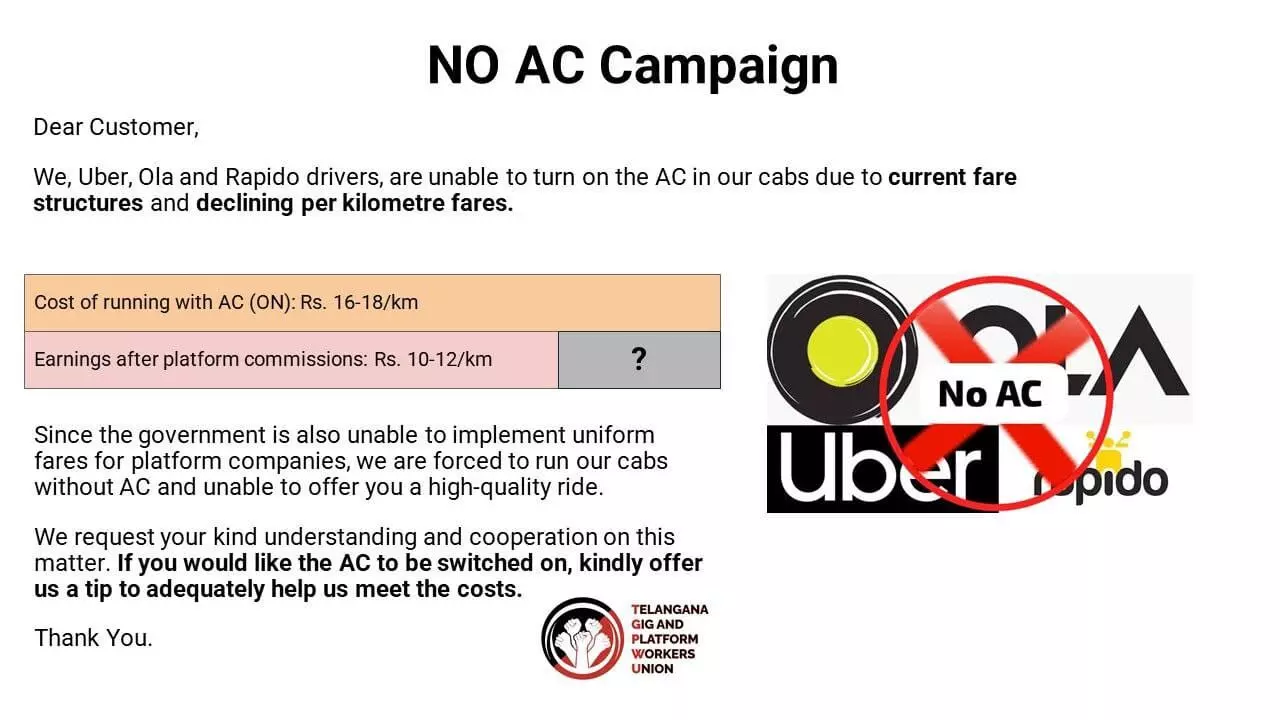
Telangana's No-AC campaign: Uber-Ola Drivers Face ID Block Amid Ongoing Protests
Telangana's No-AC campaign sheds light on the uphill battle Uber drivers face, with ongoing protests met by ID blocks, underscoring the struggle for fair conditions in the gig economy.
Abdul Naeem, a 40-year-old Uber driver in Telangana, has been protesting against the AC service mandate of the platform company.
A car fitted with good AC units has become a necessity, more than a luxury now. With the increase in average temperature and the unpredictability of seasons, travelling long distances in regular cars and buses has become impossible. The heat has often led to health complications, which have proved to be fatal in several cases.
While the passengers might endure the travel in a non-AC vehicle for a brief period, the drivers bear the brunt of the heat, considering that their livelihood depends solely on this source of income. The most common means of procuring a taxi is through online apps like Uber. With the always-increasing temperature and rising fuel prices, paying the platform commission to the apps is now an additional burden.
Is the 'No-AC Campaign' by Uber drivers a direct consequence of the abovementioned scenario?
As the sole breadwinner for his family of three children, Naeem told Mojo Story, “AC installation increases costs and reduces profit. It causes more load on the engine, and maintenance costs also increase. Also, one does not continue driving long with AC installed."
Claiming that it cost him a 50 per cent loss from his daily average earnings, he added, "Due to excessive heat produced by the Air Conditioner, the car slows down, and even we are not able to drive the car due to the effects on our health."
Naeem's story resonates with countless gig drivers who find themselves grappling with the burdens of reduced profitability and increased maintenance expenses, all compounded by the lack of social security measures or the gig model of the platform companies.
On April 8, the Telangana Gig and Platform Workers Union (TGPWU), advocating for drivers across platforms like Uber, Ola, and Rapido, reiterated a significant concern. They emphasised that drivers find it increasingly difficult to activate air conditioning (AC) due to declining per-kilometre rates. With the cost of running AC-equipped cabs reaching Rs 16-18 per kilometre, many drivers grapple with this financial strain within the existing fare structure.
Driven by the noticeable gap between operational costs and earnings, drivers have embraced the 'No AC' campaign to trim expenses. Despite their extended work hours, the savings are minimal as maintenance costs chip away at their income. As temperatures soar to 43 degrees Celsius in Hyderabad, the movement further catches the pace.
A statement released by the Telangana Gig and Platform Workers Union (TGPWU) said, “The cost of running our cabs with AC is 16-18 rupees per kilometre. After accounting for commissions charged by platforms, we can only earn 10-12 rupees per kilometre.”
The TGPWU highlighted discrepancies in the fare presentation, highlighting that AC cab fares seemingly appear lower on ride-hailing apps than bike taxis and auto-rickshaws.
In addressing this issue, the union has urged passengers to consider offering tips if they desire to have the AC activated during their journeys, thereby assisting drivers in offsetting the supplementary expenses.
Speaking with Mojo Story, Shaik Salauddin, founder and State President of TGWPU, emphasised the dire predicament faced by drivers, highlighting that the unyielding heat poses significant health risks, leaving drivers with no recourse but to rely on AC for respite. However, the punitive financial implications of AC installation deter drivers from embracing this essential amenity, plunging them into a cycle of financial hardship.
He said, “Due to severe heat, drivers face health issues. Drivers have no options to escape heat other than AC. But why would anyone install it if the installation is causing them heavy loss?”
“Ever since the campaign was launched, platform companies have threatened drivers to permanently block their IDs on the app and not assign them airport and inter-city rides,” he added.
He stressed that the state governments should have uniform fares for the drivers, and the aggregator companies should increase the fares, too. “We will unionise and turn into a big nationwide campaign if these demands are not fulfilled,” Salauddin said.
Santosh, a driver with Uber and a part of the campaign, told Mojo Story that many customers are paying the AC cost to the drivers through tips. “If customers want the AC to be switched on during their rides, we request that they offer some tips. This solves the problem to some extent.”
"I received a notification from Uber mandating AC service, and I'm aware that some drivers' IDs have been blocked as a consequence. Managing under these circumstances becomes incredibly challenging with my car EMI, children's education expenses, and health challenges."
Mohammad Sajjad Hussain, who recently got his doctorate for research on gig workers, said, “The emergence of Ola/Uber had resulted in drivers losing their autonomy to bargain fare with the customers on the one hand and on the other hand state’s limited role in regulating the fare. Further, the commission that the digital platforms charge is often hidden from the fare shown or the fare fixed by the government authorities.”
He added, “Cab drivers and their unions have been protesting since 2018. However, with minimal success, the unions lost bargaining power with the state and the digital platform companies. Drivers are left with limited choices to raise their voices.”
Informing that the campaign was done in previous years, Hussain said, “Since 2018, the drivers’ collective power has declined, and there have been attempts to regain the power. The No-AC campaign should be seen in this light. It is a small step where the drivers attempt to raise their voices to be heard and raised again.”

